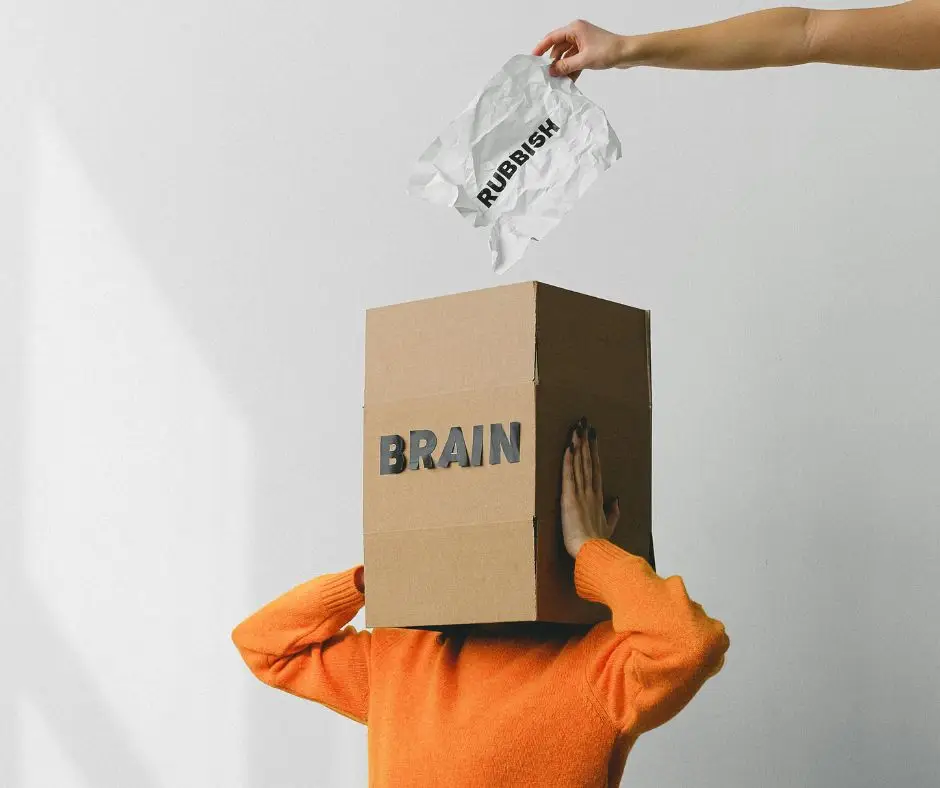We all have thoughts running through our minds every day, shaping how we feel and behave. But what if these thoughts aren’t always accurate? What if they’re actually biassed and unhelpful? These automatic thinking patterns, known as cognitive distortions, can trap us in negative cycles, impacting our mood and behaviour.
Understanding and identifying these distortions can be a powerful step towards improving your mental well-being.
Could Your Thinking Patterns Be Distorting Reality?
Automatic thoughts are swift and often subconscious. We don’t always recognize them, but they can have a profound effect on how we perceive ourselves and the world. By bringing these thoughts into the light, we can start to challenge and change them.
Here are the 12 most common unhelpful thinking styles that might be affecting you:
1. All-or-Nothing Thinking: Are You Seeing Things in Black and White?
All-or-nothing thinking, also known as black-and-white thinking, is a cognitive distortion where individuals view situations in absolute terms. There is no middle ground; things are either perfect or a complete failure. This rigid thinking style can create unnecessary stress and disappointment.
Imagine you’re working on a project at work. You make one small error, and suddenly you think, “I’ve ruined the entire project.” Or, you might be trying to eat healthily, but after indulging in a piece of cake, you think, “I’ve blown my diet; I might as well give up.”This type of thinking disregards any nuances or shades of grey, leading to a very rigid and often unfair evaluation of yourself and your circumstances.
- Identifying All-or-Nothing Thinking: Notice if you use words like “always,” “never,” “every,” or “none” in your self-talk.
- Ask yourself: Is there any evidence that supports a more balanced view? Could there be some middle ground?
2. Overgeneralization: Are You Drawing Broad Conclusions from a Single Event?
Overgeneralization is a cognitive distortion where you make broad conclusions based on a single event or a small piece of evidence. This thinking pattern leads you to believe that if something happens once, it will happen repeatedly in similar situations, regardless of context or other factors.
If you had a bad date, you might conclude, “I’ll never find a partner,” overlooking the potential for future positive experiences. Similarly, if you fail a test, you might think, “I’m terrible at everything academic,” rather than recognizing that one test does not define your overall ability or future performance.
Overgeneralization can create a sense of hopelessness and defeat, as it makes you feel trapped in a negative pattern that doesn’t actually exist. It can hinder your willingness to try new things or take risks, as you might believe that failure is inevitable.
- Identifying Overgeneralization:
To identify overgeneralization, pay attention to statements that include words like “always,” “never,” “everyone,” or “nobody.” Reflect on whether you’re making a sweeping judgement based on limited evidence. - Ask yourself:
If this really represents a pattern or if it’s just one isolated event. What are other possible outcomes?
3. Mental Filter / Disqualifying the Positive: Are You Focusing Only on the Negative?
Mental filter is a cognitive distortion where you focus exclusively on the negative aspects of a situation while ignoring any positive elements. This filtering process can significantly skew your perception of reality, leading you to view situations and yourself in a disproportionately negative light.
Imagine you received ten compliments and one piece of criticism, but all you can remember is the criticism. Or, after giving a presentation, you fixate on the one slide you stumbled over, ignoring the fact that the rest of the presentation was well-received and impactful.
Mental filter can make it difficult to appreciate positive aspects of your life and achievements. It can lead to persistent feelings of dissatisfaction and inadequacy, as the positive experiences and feedback are consistently overshadowed by the negative ones. Over time, this can erode your self-esteem and contribute to anxiety and depression.
- Identifying Mental Filter:
To identify mental filter, observe if you habitually focus on the negative details of an experience while dismissing the positive ones. Does this pattern affect your overall perception of events and your self-worth? - Ask Yourself:
Am I ignoring any positive feedback or experiences? What are some positive aspects that I’m overlooking?
4. Disqualifying the Positive: Are You Rejecting Compliments and Praise?
Disqualifying the positive is a cognitive distortion where you reject positive experiences or feedback, insisting they don’t count for some reason. This thinking pattern prevents you from acknowledging and enjoying your successes and strengths, maintaining a negative self-view despite evidence to the contrary.
Perhaps someone praises your work, but you dismiss it by thinking, “They’re just being nice,” rather than accepting that your work might indeed be good. Or, you achieve a goal but tell yourself, “It wasn’t a big deal,” minimising the effort and accomplishment involved.
Disqualifying the positive invalidates your successes and reinforces a negative self-image. It can make it hard to build self-esteem, as you constantly undermine your achievements and strengths.
This distortion can lead to a persistent feeling of inadequacy and a reluctance to accept or seek positive experiences and feedback.
- Identifying Disqualifying the Positive:
To identify this distortion, notice if you frequently dismiss or downplay positive feedback and experiences. Reflect on whether you have difficulty accepting compliments or acknowledging your achievements. - Ask yourself:
“Am I dismissing positive feedback? Why do I think it doesn’t count?”
5. Jumping to Conclusions: Are You Making Assumptions Without Evidence?
Jumping to conclusions is a cognitive distortion where you make negative assumptions or predictions without sufficient evidence. This thinking style includes mind reading (believing you know what others are thinking) and fortune-telling (predicting negative outcomes), leading to unnecessary anxiety and stress.
You might assume you know what others are thinking, such as believing a friend is mad at you because they didn’t text back immediately. Or, you predict a negative outcome without real proof, like assuming you’ll fail a job interview before it even happens based on past experiences.
Jumping to conclusions can create unnecessary anxiety and conflict in relationships. It often leads to misunderstandings and strained interactions, as you act based on assumptions rather than facts.
This distortion can also prevent you from taking opportunities or enjoying experiences, as you may prematurely conclude that they will turn out badly.
- Identifying Jumping to Conclusions:
To identify this distortion, be mindful of situations where you assume you know what others are thinking or predict outcomes without evidence. Reflect on whether these assumptions are based on facts or your own fears and insecurities. - Ask Yourself:
Do I have any concrete evidence to support this assumption? What are other possible explanations?
6. Magnification (Catastrophizing) or Minimization: Are You Blowing Things Out of Proportion?
Magnification, also known as catastrophizing, involves blowing things out of proportion and expecting the worst possible outcome. Minimization, on the other hand, involves downplaying your own strengths or positive experiences. Both distortions skew your perception, leading to increased anxiety and decreased self-worth.
You might expect the worst possible outcome in every situation, thinking, “If I fail this test, my life is over.” Conversely, you might downplay your own achievements, thinking, “Anyone could have done that,” even when you’ve worked hard and succeeded.
Magnification can lead to overwhelming stress and a sense of helplessness, as you constantly anticipate disastrous outcomes. Minimization can prevent you from recognizing and celebrating your accomplishments, leading to low self-esteem. Together, these distortions can create a persistent state of anxiety and a diminished sense of self-worth.
- Identifying Magnification or Minimization:
To identify these distortions, notice if you habitually exaggerate the importance of negative events or downplay your own successes. - Ask Yourself:
Am I exaggerating the importance of this issue? How would I advise a friend in the same situation?
7. Emotional Reasoning: Are You Assuming Your Emotions Reflect Reality?
Emotional reasoning is a cognitive distortion where you assume that your emotions reflect the true nature of reality. This means that if you feel something strongly, you believe it must be true, even in the absence of factual evidence. This can lead to decisions and beliefs that are driven by feelings rather than objective reality.
You might feel worthless and thus conclude that you are worthless, ignoring any evidence to the contrary. Or, you might feel anxious about a situation and assume it is inherently dangerous or doomed to fail, even if there are no actual signs of danger or impending failure.
Emotional reasoning can lead you to make decisions based on feelings rather than facts, which can perpetuate negative emotions and contribute to cycles of anxiety and depression. It can also distort your perception of yourself and your abilities, leading to a lack of confidence and missed opportunities.
- Identifying Emotional Reasoning:
To identify this distortion, observe if you often take your feelings as evidence of truth. Reflect on whether your emotions are based on facts or assumptions. - Ask Yourself:
Are my feelings based on facts or assumptions? What evidence do I have to support this feeling?
8. ‘Should’ Statements: Are You Burdening Yourself with Unrealistic Expectations?
Should statements are cognitive distortions where you impose rigid rules on yourself and others, often leading to feelings of guilt and frustration. These statements reflect unrealistic expectations and can create a sense of constant pressure and dissatisfaction when they are not met.
You might tell yourself, “I should always be happy,” or “I must be perfect,” setting yourself up for disappointment when reality falls short of these impossible standards. Or, you might think, “People should always be kind,” and feel frustrated or angry when they are not.
Should statements can lead to chronic stress and self-criticism as you constantly feel you are falling short of your own expectations. They can also create tension in relationships, as you impose unrealistic expectations on others. This can result in feelings of frustration, disappointment, and resentment.
- Identifying Should Statements:
To identify this distortion, notice if you frequently use words like “should,” “must,” or “ought” in your self-talk. Reflect on whether these expectations are realistic or helpful. - Ask Yourself:
Am I setting up unrealistic expectations for myself or others? What would be a more flexible way of thinking?
9. Labelling or Mislabeling: Are You Defining Yourself or Others by Mistakes?
Labelling or mislabeling is a cognitive distortion where you define yourself or others by a single event or behaviour, rather than seeing the person as a whole. This often involves attaching a negative label based on one instance, which can perpetuate a negative self-image or judgement of others.
Instead of saying, “I made a mistake,” you might say, “I’m an idiot,” attaching a negative label to yourself based on one instance. Similarly, if someone else makes a mistake, you might think, “They’re incompetent,” rather than considering the broader context of their abilities and actions.
Labelling or mislabeling can lead to a fixed mindset where you view yourself or others as inherently flawed. This can prevent growth and improvement, as you believe that these labels are unchangeable. It can also lead to harsh self-judgement and strained relationships due to unrealistic expectations and negative perceptions.
- Identifying Labelling and Mislabeling:
To identify this distortion, notice if you frequently attach labels to yourself or others based on single events. Reflect on whether it is fair to define someone entirely based on one mistake. - Ask Yourself:
Is it fair to define myself or someone else entirely based on one mistake? How can I describe the situation more accurately?
10. Personalization: Are You Taking Things Too Personally?
Personalization is a cognitive distortion where you take responsibility for events outside your control. This often involves believing that everything others do or say is some kind of direct, personal reaction to you, leading to excessive guilt and a diminished sense of control over your life.
You might assume responsibility for a team’s failure at work, thinking, “It’s my fault that our team lost,” even when it’s a collective outcome. Or, if someone is in a bad mood, you might think, “They must be upset with me,” without considering other factors that could be affecting their behaviour.
Personalization can lead to excessive guilt and anxiety, as you constantly feel responsible for things beyond your control. This distortion can diminish your sense of agency and lead to a pervasive sense of inadequacy. It can also create misunderstandings and unnecessary stress in relationships.
- Identifying Personalization:
To identify this distortion, notice if you frequently take responsibility for events or others’ feelings that are outside your control. Reflect on whether these assumptions are realistic and fair. - Ask Yourself:
Am I really responsible for this outcome? What factors are outside my control?
11. Blaming / Externalisation: Are You Holding Others Responsible for Your Feelings?
This is the flip side of personalization. Blaming is a cognitive distortion where you hold others responsible for your feelings or situations, avoiding personal accountability. This can prevent you from addressing your own role in events and hinder your ability to take control of your life and emotions.
You might think, “They make me feel worthless,” instead of recognizing and addressing your own feelings of self-worth. Or, you might blame a partner for your unhappiness, thinking, “If they were different, I’d be happy,” rather than exploring how you can find happiness within yourself.
Blaming others can prevent you from taking responsibility for your own emotions and actions, which is essential for personal growth. This distortion can lead to feelings of helplessness and resentment, as you place control of your happiness and well-being in the hands of others. It can also strain relationships, as others may feel unfairly held accountable for your feelings.
- Identifying Blaming:
To identify this distortion, notice if you frequently hold others responsible for your feelings or situations. Reflect on whether this prevents you from taking personal accountability. - Ask Yourself:
Am I blaming others to avoid facing my own feelings? How can I take responsibility for my emotions?
12. Control Fallacies: Are You Feeling Powerless or Overly Responsible?
Control fallacies are cognitive distortions where you believe you have no control over your life or that you are responsible for everything and everyone. These extreme beliefs can lead to a victim mentality or an overwhelming sense of responsibility, both of which are unhealthy and unproductive.
You might feel like you have no control over your life, thinking, “There’s nothing I can do about my situation,” which can lead to feelings of helplessness. Alternatively, you might feel overly responsible for others’ happiness, thinking, “I must make sure everyone is happy,” which can lead to burnout and stress.
Believing you are powerless can lead to a victim mentality, where you feel unable to change your circumstances and improve your life. Feeling overly responsible can lead to chronic stress and burnout, as you take on more than you can handle. Both fallacies can prevent you from living a balanced and fulfilling life.
- Identifying Control Fallacies:
To identify these distortions, observe if you frequently feel powerless or overly responsible for others. Reflect on whether these beliefs are realistic and helpful. - Ask yourself:
What aspects of this situation can I realistically control? Am I taking on too much / too little responsibility?
How to Challenge Your Cognitive Distortions
Identifying these thinking patterns is the first step towards change. Here’s how you can start challenging them:
- Hold the Thought at Arm’s Length: Try to look at your thought objectively. Is it really true? Could there be another explanation?
- Gather Evidence: List the evidence for and against your thought. This helps in seeing the bigger picture.
- Ask Yourself: Would you say this to a friend? Often, we’re much harsher on ourselves than on others.
- Reframe the Thought: Replace the unhelpful thought with a more balanced one. Instead of saying, “I’ll never succeed,” try, “I might have setbacks, but I can keep trying.”
Even the smartest people aren’t immune to unhelpful thought patterns, especially after a breakup or any significant life change that sends us spiralling. Our minds are wired to seek patterns and make sense of the world, but this can sometimes lead to distorted thinking.
However, by regularly recognizing and challenging these unhelpful thought patterns, you’ll begin to bounce back faster. It’s not about eliminating these thoughts entirely but about developing the resilience to question and reframe them.
With practice, you can train your mind to respond more adaptively, turning setbacks into opportunities for growth.
If these cognitive distortions feel overwhelming, you don’t have to tackle them alone. A psychologist can help you understand the root causes and develop healthier coping mechanisms. With over 25 years of experience, Jeanette Dreyer offers compassionate and effective guidance tailored to your unique needs. Together, we can work towards freeing you from the automatic thoughts that hold you back.
Take the First Step Towards Healthier Thinking
Remember, everyone has unhelpful thoughts from time to time. The key is to become aware of them and take steps to challenge and change them. By doing so, you can improve your mood, behaviour, and overall well-being. You have the power to change your thoughts and, ultimately, your life.





